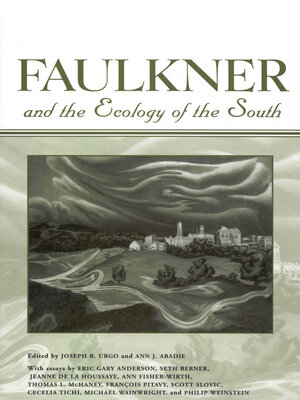
Sign up to save your library
With an OverDrive account, you can save your favorite libraries for at-a-glance information about availability. Find out more about OverDrive accounts.
Find this title in Libby, the library reading app by OverDrive.



Search for a digital library with this title
Title found at these libraries:
| Library Name | Distance |
|---|---|
| Loading... |
In 1952, Faulkner noted the exceptional nature of the South when he characterized it as "the only really authentic region in the United States, because a deep indestructible bond still exists between man and his environment."
The essays collected in Faulkner and the Ecology of the South explore Faulkner's environmental imagination, seeking what Ann Fisher-Wirth calls the : "ecological counter-melody" of his texts. "Ecology" was not a term in common use outside the sciences in Faulkner's time. However, the word "environment" seems to have held deep meaning for Faulkner. Often he repeated his abiding interest in "man in conflict with himself, with his fellow man, or with his time and place, his environment."
Eco-criticism has led to a renewed interest among literary scholars for what in this volume Cecelia Tichi calls, "humanness within congeries of habitats and environments." Philip Weinstein draws on Pierre Bourdieu's notion of habitus. Eric Anderson argues that Faulkner's fiction has much to do with ecology in the sense that his work often examines the ways in which human communities interact with the natural world, and François Pitavy sees Faulkner's wilderness as unnatural in the ways it represents reflections of man's longings and frustrations. Throughout these essays, scholars illuminate in fresh ways the precarious ecosystem of Yoknapatawpha County.
The essays collected in Faulkner and the Ecology of the South explore Faulkner's environmental imagination, seeking what Ann Fisher-Wirth calls the : "ecological counter-melody" of his texts. "Ecology" was not a term in common use outside the sciences in Faulkner's time. However, the word "environment" seems to have held deep meaning for Faulkner. Often he repeated his abiding interest in "man in conflict with himself, with his fellow man, or with his time and place, his environment."
Eco-criticism has led to a renewed interest among literary scholars for what in this volume Cecelia Tichi calls, "humanness within congeries of habitats and environments." Philip Weinstein draws on Pierre Bourdieu's notion of habitus. Eric Anderson argues that Faulkner's fiction has much to do with ecology in the sense that his work often examines the ways in which human communities interact with the natural world, and François Pitavy sees Faulkner's wilderness as unnatural in the ways it represents reflections of man's longings and frustrations. Throughout these essays, scholars illuminate in fresh ways the precarious ecosystem of Yoknapatawpha County.







